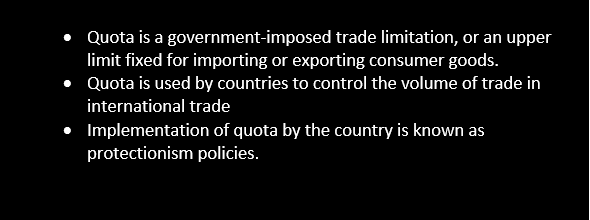Definition
Related Definitions
Quota
What is Quota?
Quota is a government-imposed trade limitation, or an upper limit fixed for importing or exporting the consumer goods during a particular period. The government usually impose quota to protect domestic businesses or when they want to restrict a foreign power from controlling too much its market.
Quota is used by countries to control the volume of trade in international trade between countries. To enhance the domestic production countries sometimes impose quota on specific products. The quota can restrict total value of the goods or the volume of the goods that the country can export to the country.

Source: Copyright © 2021 Kalkine Media
How Quota Works
Quotas focus on restricting the quantities of a product that a country imports or exports and it can be hard for the imposing country to manage as they required adequate import controls and proper record-keeping. Whereas, traffic are the taxes or specific fees on imported goods and is also used to increase the overall cost to the supplier or manufacturer seeking to sell their goods or services within a country.
Tariff can be the source of extra revenue for the country and also provide protection to domestic business by raising the prices of the imported goods for domestic customers.
Quota can be more effective than tariff in limiting trade if the country’s domestic demand is not sensitive to the increase in prices of the good. Implementation of Quota by the country is known as Protectionism policies. Usually, country approves these policies if they have concern over the quality and safety of the imported goods.

Source: Copyright © 2021 Kalkine Media
Objectives of Quota
- To provide protection to domestic businesses by limiting the foreign competitions and imports.
- Limiting imports through quota can help country to reduce deficit in the balance of payment.
- To conserve the limited foreign exchange resources and direct them for high-priority import items.
- If another country has imposed quota on the country’s goods and services, they may use quota to retaliate.
- To ensure the stabilisation of the internal price level by effectively regulating the import of the country.
- To prevent conspicuous consumption by the wealthy sections by imposing quota limitation on the imported luxury goods.
- By imposing high quota for the goods and services, countries may improve the international bargaining position as it enable a liberal inflow of the goods and services of the home country.
- To check the speculative imports in anticipation of changes in exchange rates, credit policy, internal money and tariff rates, the government may take resort to import quota.
Types of Quotas
- Tariff Quota or custom quota
Tariff Quota or Custom quota allows import of the specific quantity of goods duty-free or at a low rate of duty. However, importing goods in excess of the fixed limit charges a higher rate of duty. Thus, tariff quota combines the feature of quota and tariff. Flexibility is the greatest con of the tariff quota.
- The Unilateral Quota
Under this quota, a country imposes an absolute limit on the quantity of the goods to be imported during a given period without any prior negotiation with other countries. The unilateral quota may be either global or allocated. Under a Global Unilateral quota the goods and services can be imported from any nation up to the full amount of quota, whereas in allocated unilateral quota the total of the quota is distributed among specified exporting countries.
- The Bilateral quota
The bilateral quota is fixed by prior negotiation between the importing and exporting nation. The advantages of bilateral quotas are that it is decided by mutual agreement, avoid excessive fluctuations in imports, minimizes the suspicion of discrimination, provokes no retaliation activity and excludes export monopolies by agreement.
- The Mixing Quota
The mixed quota is a type of regulation in which manufacturer needs to use some portion of domestic raw material with imported parts to produce finished goods domestically.
The country sets restriction on the proportion of raw material imported from another country and used in domestic manufacturing.
- Import Licensing
The government of the country use import licensing as a system devised to administer quota regulation. The importers need to have a license from the authorities for importing any quantity of goods within specified quotas.
The advantage of import licensing is that it offers much control over the volume of imports, allow high flexibility, reduce excessive fluctuations in prices, minimize speculative activity, and allow country to control the demand of its nationals for foreign exchange.
Real World Example
In January 2018, former US President Donald Trump imposed 30% tariff on the solar panels imported from China, which lead to trade disputes, trade wars and other various problem between countries and other nations.
This move led more aggressive approach towards China’s economic and political stance, and it also affected US solar industry. It was responsible for generating US $18.7 billion of investments in the US economy and which at the time imported 80% to 90% of its solar panel products.
